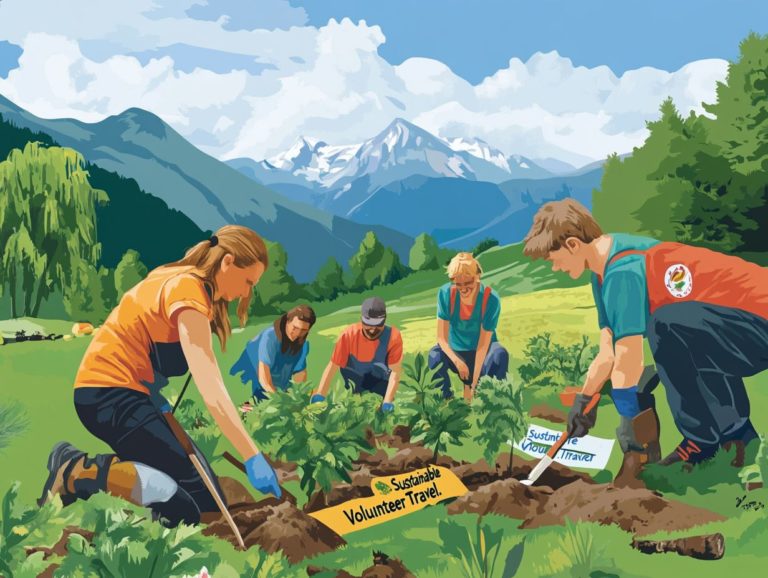How to Respect Cultural Heritage While Traveling
Traveling presents a remarkable opportunity to connect with diverse cultures. However, it carries an equally important responsibility to respect and honor their rich heritage.
This exploration delves into the significance of cultural heritage. It offers insights on how to approach your journeys with a mindful perspective. You ll discover practical tips that range from understanding local traditions to behaving appropriately at historical sites. All these tips are designed to enrich your travel experience while ensuring you remain a respectful visitor.
Embark on this journey with us as we uncover essential ways to travel thoughtfully and supportively. Let s make your adventures not just memorable, but meaningful!
Contents
- Key Takeaways:
- Understanding Cultural Heritage
- Researching Before Your Trip
- Respecting Cultural Sites and Artifacts
- Interacting with Local Communities
- Frequently Asked Questions
- What is cultural heritage and why is it important to respect it while traveling?
- How can I educate myself about the cultural heritage of the places I am visiting?
- What are some ways to show respect for cultural heritage while traveling?
- Is it okay to take photos of cultural heritage sites and artifacts while traveling?
- What should I do if I accidentally offend someone’s cultural heritage while traveling?
- How can I support the preservation of cultural heritage while traveling?
Key Takeaways:
- Do Your Research: Before visiting a new country, understand and respect their cultural heritage.
- Be Mindful: When visiting historical sites and purchasing artifacts, be respectful, as they hold significant cultural value.
- Engage Respectfully: Support local communities by respecting their traditions and businesses to preserve and honor their cultural heritage.
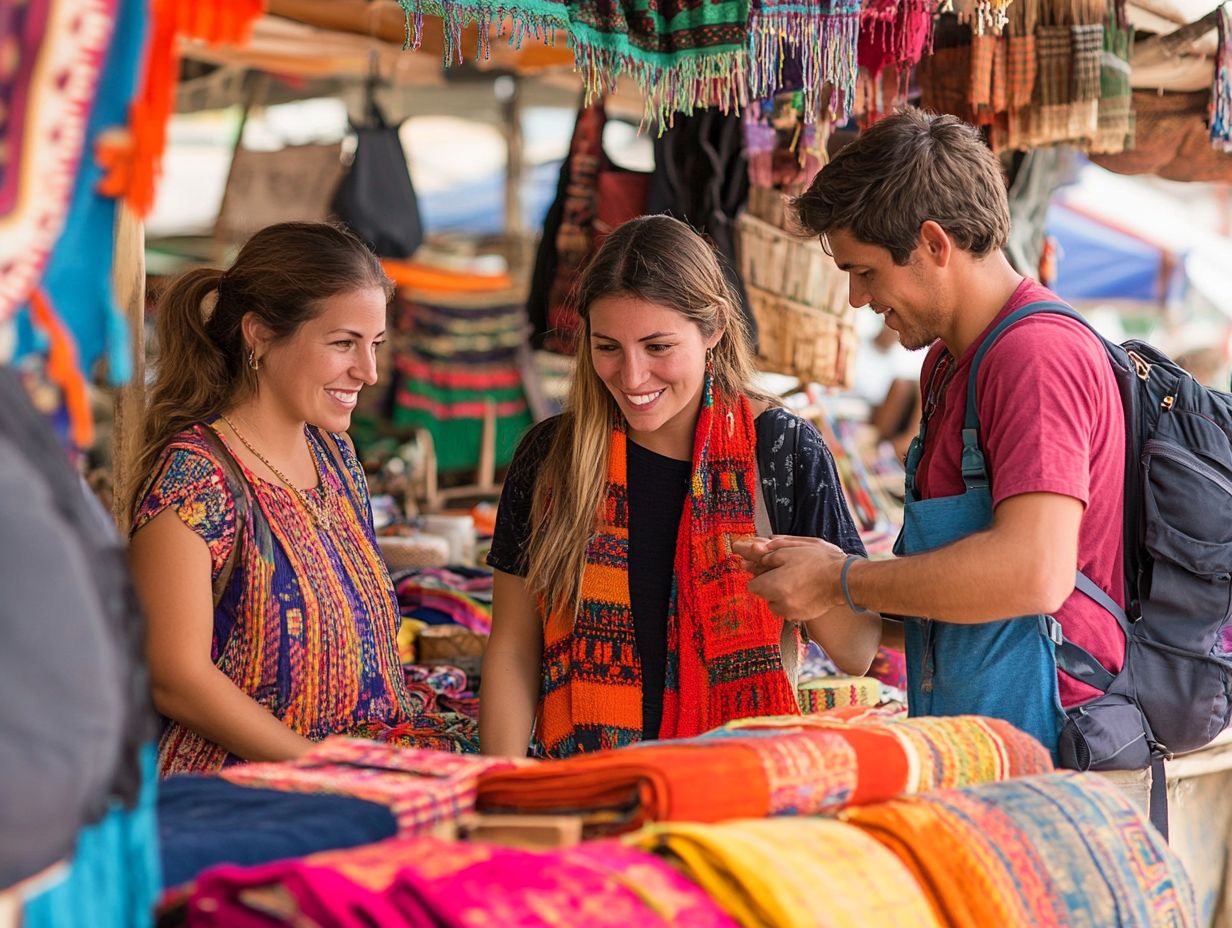
Understanding Cultural Heritage
Understanding cultural heritage is vital for your journey toward conscious travel. It encompasses the shared history, traditions, and customs of communities worldwide. From the rich landscapes of Iraq to the vibrant streets of Zambia and the soulful ambiance of New Orleans, each locale offers unique insights.
This deep dive into local cultures unveils the authenticity of your experiences. It also cultivates a genuine respect for the people and their ways of life. By immersing yourself in cultural heritage, you enhance your global awareness and contribute meaningfully to community development. All this is achieved while savoring the intricate tapestry of human history.
Defining Cultural Heritage
Cultural heritage encompasses the traditions, customs, and historical artifacts that form the essence of a community s identity and way of life.
Consider the vibrant festivals of India, where intricate rituals and colorful attire weave together a tapestry rich in history. Alternatively, think of Italy, where every dish serves as a delicious narrative, reflecting regional histories and familial ties.
Elements like the ancient ruins in Greece or the indigenous art in Australia are pivotal in shaping local identities. They offer travelers experiences steeped in authenticity.
By engaging with these cultural narratives, you enhance your visit and cultivate a deeper appreciation for diversity. Each community s heritage is, after all, a treasure trove of stories, values, and collective memories waiting to be explored.
Why it is Important to Respect
Respecting cultural heritage is essential for nurturing understanding different cultures and elevating your travel experience to one that embodies ethical practices.
As you explore new destinations, being mindful of local customs and traditions is vital, as these elements often embody a community’s identity. Whether you learn a few phrases in the native language, dress appropriately for religious sites, or respectfully participate in local ceremonies, these small gestures can profoundly enrich your journey.
Observing local etiquette like greeting people with a warm smile or graciously accepting offerings demonstrates genuine appreciation for the diverse cultures you encounter. By embracing these practices, you not only enhance your personal experiences but also help preserve the traditions you admire.
Researching Before Your Trip
Researching before your trip is an essential step in crafting a travel experience that is both meaningful and respectful to the local communities you seek to engage with. By immersing yourself in the customs and traditions of destinations like Fiji, Guangxi, and Moldova, you equip yourself to navigate cultural nuances with grace and sensitivity.
This preparation enriches your journey and bolsters local economies and businesses, ultimately fostering sustainable tourism, which benefits local communities while preserving their culture.
Learning about Local Customs and Traditions
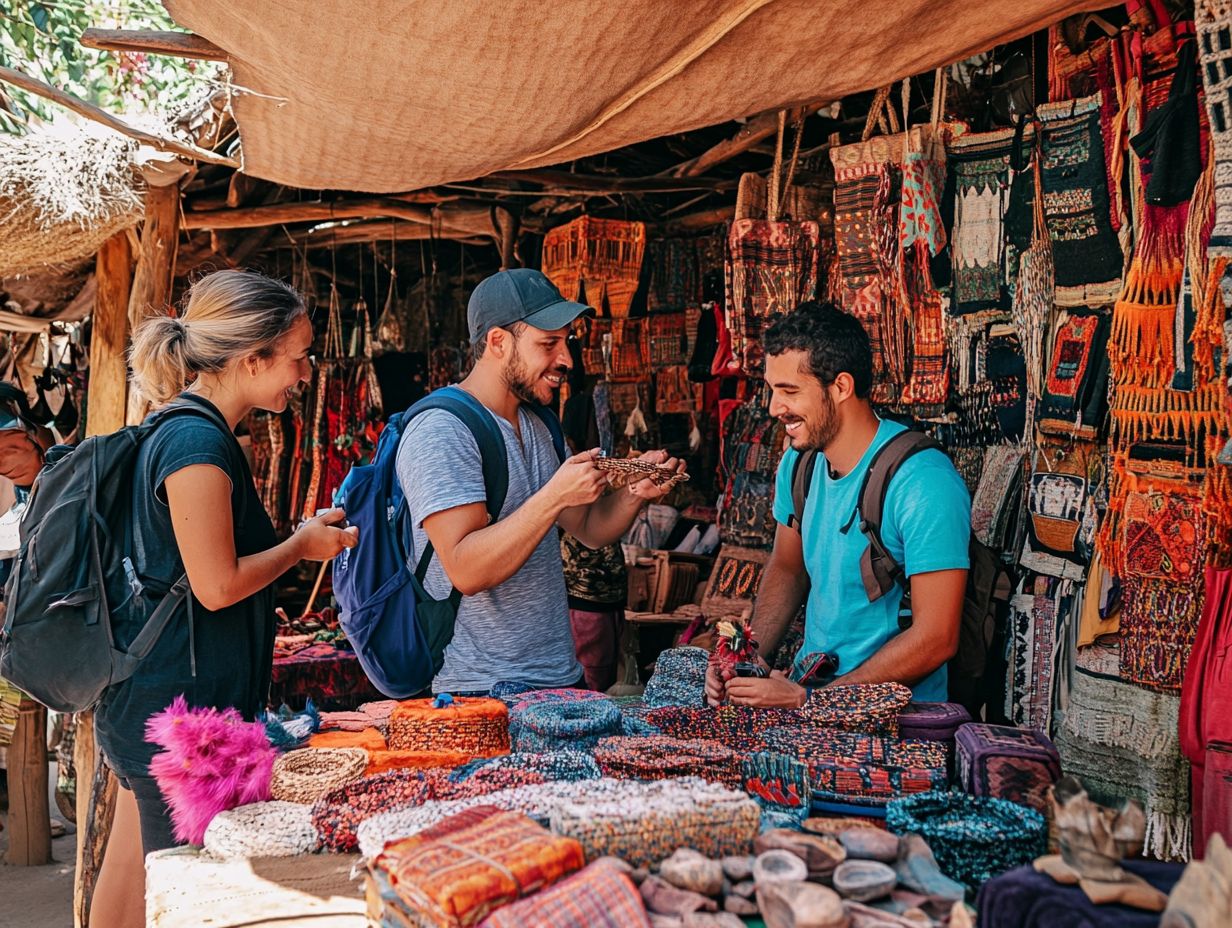
Understanding local customs and traditions can truly elevate your travel experiences. This allows you to engage more meaningfully with the culture you’re about to explore.
Dive into local literature, attend cultural workshops, or participate in community events. You will immerse yourself in the rich nuances of everyday life. These activities foster dialogue between you and the residents, creating a rich tapestry of shared perspectives.
Such interactions broaden your horizons and cultivate mutual respect. They deepen connections across diverse cultures and enhance your overall travel experience.
Identifying Sensitive Areas
Identifying sensitive areas is essential for ensuring your travel plans align with the values and norms of local communities.
Understanding these nuances requires a blend of thorough research and genuine community engagement. Start by exploring local customs and historical contexts through reliable sources like travel guides and academic studies. Engage with community members on social media to gain insights into what is considered important.
Discussing your travel intentions with locals can reveal sacred sites or practices that deserve your utmost respect. Learning how to support indigenous cultures while traveling enriches your experience and fosters a deeper connection with the community.
Respecting Cultural Sites and Artifacts
Respecting cultural sites and artifacts is crucial for preserving local heritage, ensuring future generations can appreciate these treasures. If you visit places like Scotland or UNESCO World Heritage Sites, it’s vital to follow travel etiquette, which means adhering to local rules and customs.
By understanding the significance of these sites, you enrich your travel experiences and cultivate a respectful connection with local people and traditions while also learning how to respect wildlife while traveling.
Proper Behavior at Historical Sites
Exhibiting proper behavior at historical sites shows respect for the culture and history they embody. Pay attention to dress codes, often dictated by the site’s cultural significance. Many religious sites require modest attire to reflect respect for the beliefs practiced there.
Avoid flash photography, especially in sacred spaces, to honor the solemnity of the environment. Maintaining a low noise level is vital, as loud conversations can disrupt the contemplative atmosphere of these cherished locations.
These practices show good travel etiquette and help you appreciate the rich heritage that historical sites represent.
Handling and Purchasing Artifacts
When handling and purchasing artifacts, embracing ethical travel practices is essential. This supports local businesses and conservation efforts while ensuring your purchases positively impact the local economy.
Prioritize items with verified provenance to ensure the artifacts have been sourced legally and ethically. Engaging with local artisans enriches your travel experience and ensures your purchases benefit those who rely on tourism.
Respecting cultural heritage also means understanding and adhering to local customs. Refrain from photographing sacred sites or artifacts unless you have explicit permission.
By making conscious choices, you help safeguard cultural treasures and play a pivotal role in fostering sustainable tourism that empowers communities economically and preserves unique heritages for future generations. Additionally, it’s important to learn about how to respect local wildlife while traveling to ensure that our adventures do not negatively impact the environments we explore.
Interacting with Local Communities
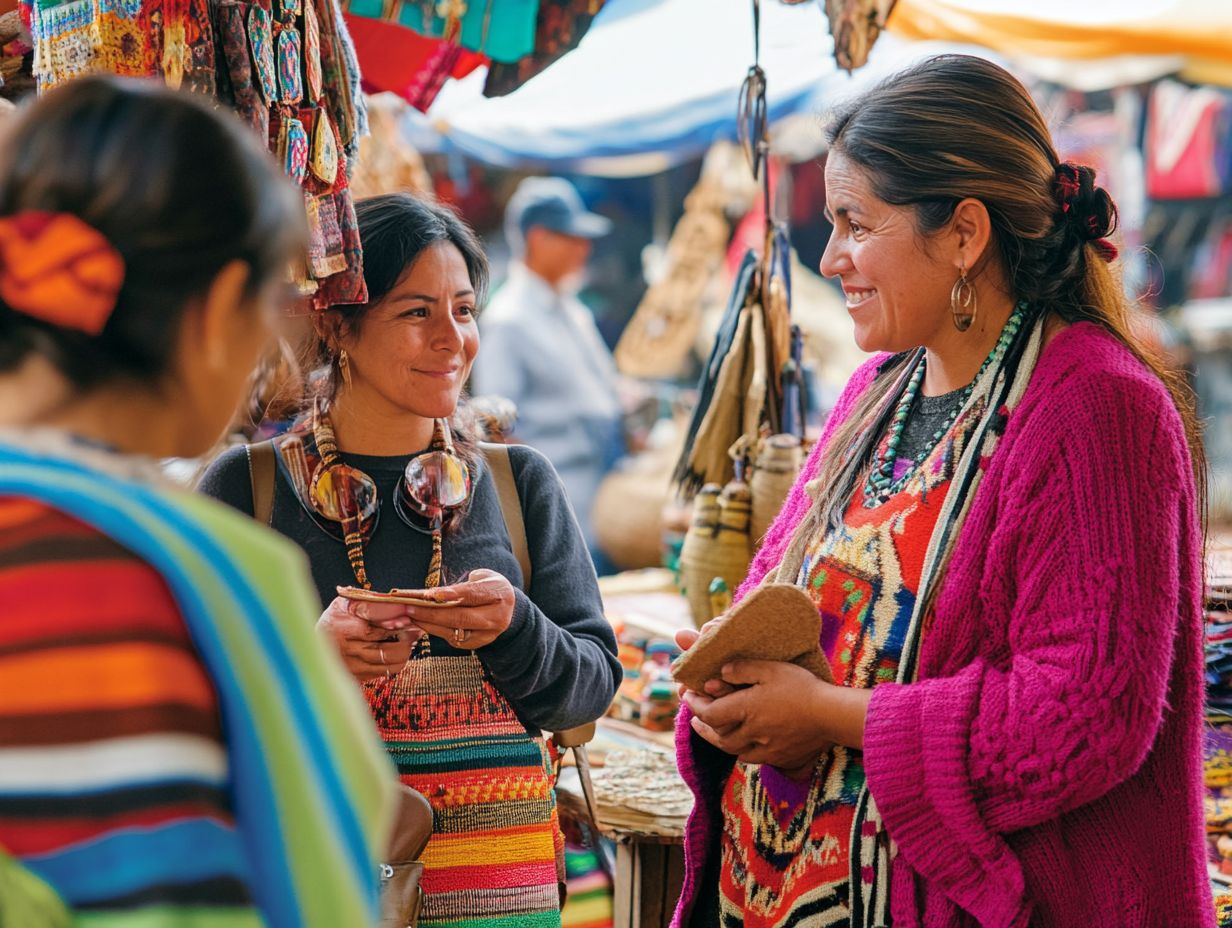
Interacting with local communities is one of the most enriching aspects of travel. It offers you the chance for sharing cultures and authentic experiences. Whether you find yourself wandering through vibrant local markets in Ecuador or getting involved in community projects in Poland, the connections you forge with the people you meet will deepen your understanding and appreciation of their culture.
Supporting local businesses and engaging in community initiatives contribute positively to their development. You gain insights that transform your travel experience into something truly memorable, fostering authenticity in your interactions.
Engaging with Respect and Openness
Engaging with respect and openness is essential when you interact with local communities during your travels. This approach elevates the quality of your experiences and nurtures deeper connections with the people you encounter.
Recognizing and appreciating cultural differences creates opportunities for meaningful dialogue and mutual understanding. For example, participating in local customs, sharing a traditional meal, or joining in on a festival immerses you in the true essence of a destination while also highlighting the importance of travel etiquette: respecting local customs.
Always listen actively; you ll uncover amazing local stories! Ask open-ended questions that encourage locals to share their stories and traditions. This mindset enriches your travel adventures and establishes a bridge of respect and goodwill between diverse cultures.
Supporting Local Businesses and Traditions
Supporting local businesses and traditions is a remarkable way for you to contribute to community development. It also enriches your travel experience.
By shopping at local markets, dining in family-owned restaurants, or booking with independent tour guides, you play a significant role in nurturing a vibrant local economy. This choice helps artisans and entrepreneurs flourish while preserving cultural heritage and promoting ways to protect the environment while meeting community needs.
When you spend your money where it directly benefits the community, you often stumble upon unique products that chain stores cannot replicate. Act now! Make ethical spending choices to shape your travel experience and support local communities.
Frequently Asked Questions
What is cultural heritage and why is it important to respect it while traveling?
Cultural heritage refers to the customs, traditions, beliefs, and artifacts passed down within a particular society. Respecting cultural heritage while traveling helps preserve and protect the unique identities and values of different communities.
How can I educate myself about the cultural heritage of the places I am visiting?
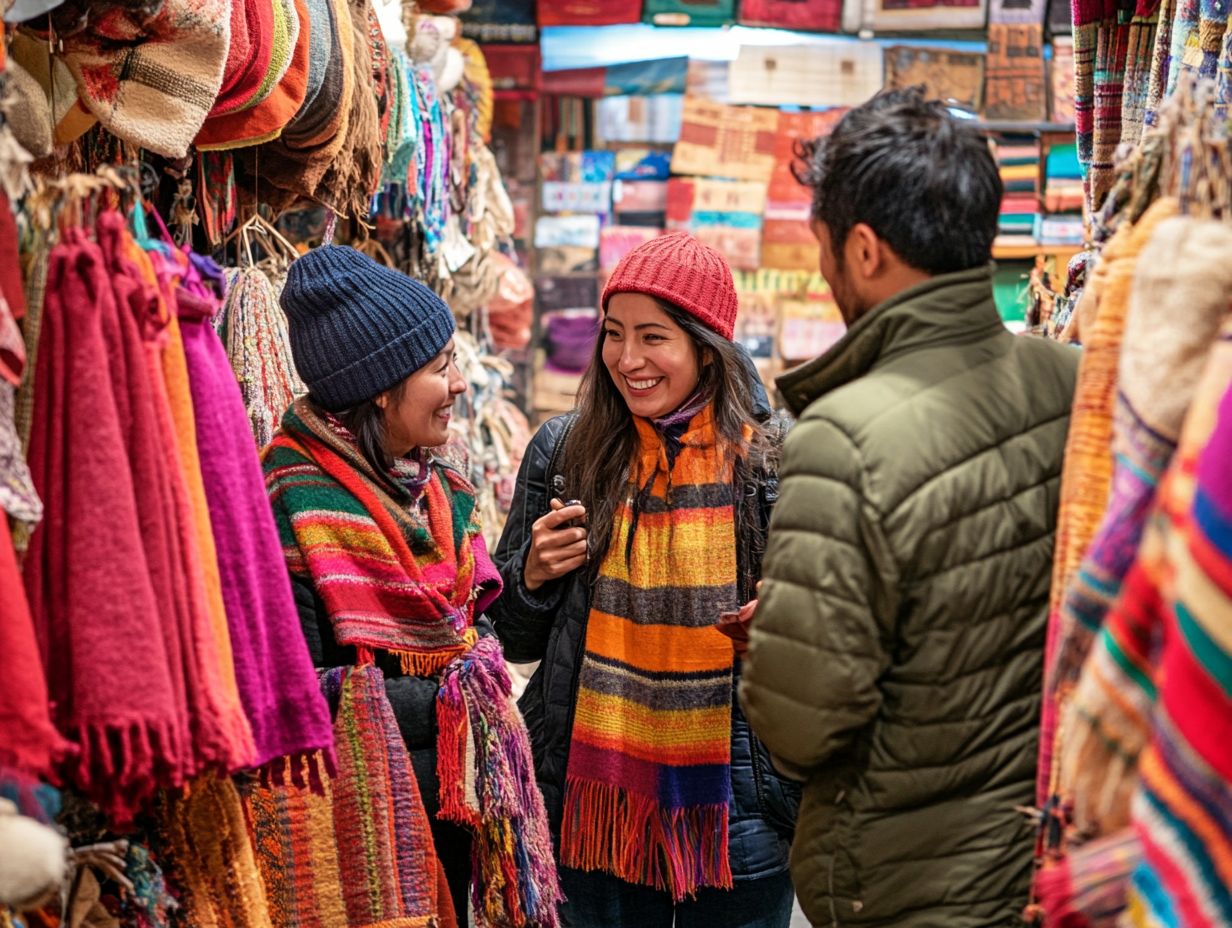
Before traveling, research the history and customs of the places you plan to visit. Read books, watch documentaries, and talk to locals to gain a deeper understanding of their cultural heritage. This will help you appreciate and respect their traditions during your travels.
What are some ways to show respect for cultural heritage while traveling?
Some ways to show respect for cultural heritage while traveling include dressing appropriately, learning basic phrases in the local language, participating in cultural activities or festivals, and being mindful of local customs and traditions.
Is it okay to take photos of cultural heritage sites and artifacts while traveling?
In most cases, it is acceptable to take photos of cultural heritage sites and artifacts, but it is important to do so respectfully. Ask for permission before taking photos, and be mindful of any restrictions or guidelines set by the local community.
What should I do if I accidentally offend someone’s cultural heritage while traveling?
If you find yourself in a situation where you’ve offended someone’s cultural heritage, don’t hesitate to apologize sincerely! Genuine respect and a willingness to learn can mend unintentional offenses.
How can I support the preservation of cultural heritage while traveling?
Support cultural heritage by buying locally made souvenirs. This helps boost the local economy.
It also helps preserve traditional crafts and practices. Visit cultural heritage sites and museums. Your ticket fees often aid in their preservation.


